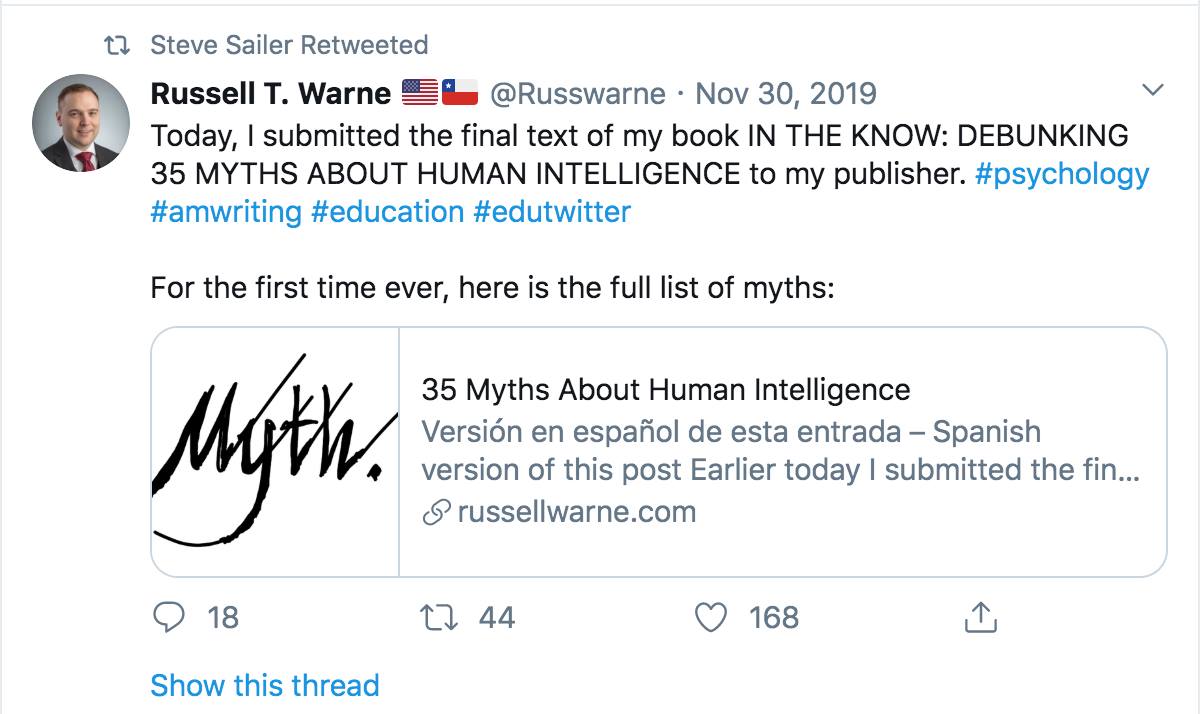Russell T. Warne
Psychologist – Data Analyst – Educator
(a book answering the science-denialists)
[“E]arlier today I submitted the final text for my upcoming book In the Know: Debunking 35 Myths About Human Intelligence. It feels good to have it in the hands of my publisher. There is still some work to do, but most of it is work that my publisher has to do–not me.
The book has 35 chapters (one per myth), plus an introduction and a conclusion. The chapters are each short enough that they can be read in one sitting, and the language is as non-technical as possible. My goal was to have the book serve as a convenient reference that people could use to combat common incorrect ideas about intelligence.
The book will be published in fall 2020. In the meantime, here are the myths that the book addresses:
Section 1: The Nature of Intelligence
Intelligence is whatever collection of tasks a psychologist puts on a test.
Intelligence is too complex to summarize with one number.
IQ does not correspond to brain anatomy or functioning.
Intelligence is a Western concept that does not apply to non-Western cultures.
There are multiple intelligences in the human mind.
Practical intelligence is a real ability, separate from general intelligence.
Fact: there are aspects of brain anatomy and functioning that correlate with IQ scores.
Section 2: Measuring Intelligence
Measuring intelligence is difficult.
Content on intelligence tests is trivial and cannot measure intelligence.
Intelligence tests are imperfect and cannot be used or trusted.
Intelligence tests are biased against diverse populations.
Section 3: Influences on Intelligence
IQ only reflects a person’s socioeconomic status.
High heritability for intelligence means that raising IQ is impossible.
Genes are not important for determining intelligence.
Environmentally driven changes in IQ mean that intelligence is malleable.
Social interventions can drastically raise IQ.
Brain training programs can raise IQ.
Improvability of IQ means intelligence can be equalized.
The reality is that geneticists have identified hundreds of DNA segments that are associated with intelligence. In fact, in some samples, genes have a larger impact than environment on IQ.
Section 4: Intelligence and Education
Every child is gifted.
Effective schools can make every child academically proficient.
Non-cognitive variables have powerful effects on academic achievement.
Admissions tests are a barrier to college for underrepresented students.
Section 5: Life Consequences of Intelligence
IQ scores only measure how good someone is at taking intelligence tests.
Intelligence is not important in the workplace.
Intelligence tests are designed to create or perpetuate a false meritocracy.
Very high intelligence is not more beneficial than moderately high intelligence.
Emotional intelligence is a real ability that is helpful in life.
It is a myth that schools can equalize children in their knowledge, academic skills, or intelligence.
Section 6: Demographic Group Differences
Males and females have the same distribution of IQ scores.
Racial/Ethnic group IQ differences are completely environmental in origin.
Unique influences operate on one group’s intelligence test scores.
Stereotype threat explains score gaps among demographic groups.
Section 7: Societal and Ethical Issues
Controversial or unpopular ideas should be held to a higher standard of evidence.
Past controversies taint modern research on intelligence.
Intelligence research leads to negative social policies.
Intelligence research undermines the fight against inequality.
Everyone is about as smart as I am.
